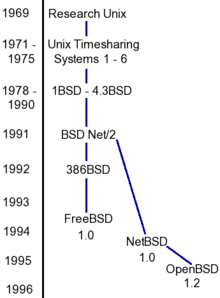Software fork: Difference between revisions
Jump to navigation
Jump to search

imported>Eric M Gearhart (Added my image from BSD) |
imported>Subpagination Bot m (Add {{subpages}} and remove any categories (details)) |
||
| Line 1: | Line 1: | ||
{{subpages}} | |||
: ''This article is about "forking" of a software project into two or more different projects. For the operating system term for starting a new process, see [[fork (operating system)]]'' | : ''This article is about "forking" of a software project into two or more different projects. For the operating system term for starting a new process, see [[fork (operating system)]]'' | ||
| Line 11: | Line 13: | ||
==External Links== | ==External Links== | ||
[http://www.levenez.com/unix/ UNIX History], also has a UNIX timeline with a detailed diagram listing forks from the original Unix | [http://www.levenez.com/unix/ UNIX History], also has a UNIX timeline with a detailed diagram listing forks from the original Unix | ||
Revision as of 17:20, 14 November 2007
- This article is about "forking" of a software project into two or more different projects. For the operating system term for starting a new process, see fork (operating system)
A fork of a computer software project is generally a version of the original software that makes use of the same (or a compatible) license, but with a development team that is usually under "new management." Forks usually occur when fundamental design differences can't be agreed upon.
Notable Forks in the History of Software development
- Unix has been forked literally hundreds, if not thousands of times from the original software developed at Bell Labs
- "The BSDs" (FreeBSD, NetBSD and OpenBSD) are three popular forks of the original Berkeley Software Distribution, which is itself a descendant of Unix
External Links
UNIX History, also has a UNIX timeline with a detailed diagram listing forks from the original Unix
